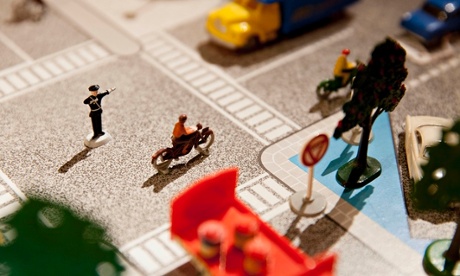
A faintly comic spectre haunts the bright postcard-pastoral of this week’s poem, The service sector by Lee Harwood. The title gives us a clue, prepares us for possibilities of dodgy dealing. But, at first, manipulation is merely child’s play. Real estate? Well, there’s the doll’s house “set down by an unseen hand”, an instinctive aesthetic pleasure hinted in the matching of the little white house to the “brilliant white breakers” that contrast so picturesquely with “a peacock green sea”. The possibly sinister information, that the doll’s house is joining other “white buildings”, is delayed, then presented casually, a mere finishing touch to the decorative process. Toy-land urbanisation continues in the fifth couplet: the houses are now occupied by tiny, timid people, although the giant seems less likely to be a child at play. A shift to workaday realism ensues, with a tercet illustrating the traffic of industry (trucks) and people (cars). The dogs “obsessively” mark territory. There’s a soundtrack of busy sibilants.
“Time” at the beginning of the next stanza announces the pun on “minute”. The tiny people dress in tiny (“minute”) coats so as to enter the servitude of clock-time. The “matchbox car” cunningly echoes a famous toy brand, and the menace is heightened by the (authorial?) voice of warning: “Best not.”
Danger is indescribably “out there”. But “out there”, like the service sector, is vague and vast. The “nervous chatter” suggests people uneasy at their pseudo-reality. Harwood’s casual grammar earlier kept the tone jaunty. Now the diction slows and interrogates itself: the almost-lyric poem approaches the tenor of Language Poetry. Displacements occur. Terms like “duty” and “just doing your job” (and perhaps also “warnings and “not failing”) belong to older ideas of honest labour; they are also the get-out clauses of the war criminal.
If the “strong south-west wind” of stanza nine seems at first a little bland as an image of blind power, its action undramatic as it “pulls/ tugs the matchbox car and passers by”, this is not unintentional. Threat in the poem is always covert. The emphasis, now, on the single matchbox car reminds us that such frail craft stands little chance in an economic gale. It points up the deceit of the leisure industry, that there could be such a thing as pure play without violence, without the exploitation and dislocation of all the players.
Unsullied, or less-sullied, by tertiary economics, hills rise beyond the town in stanza ten. People have taken the place of buildings: they might be on a guided walk as they cross the chalk ridge. The tone of the narrator becomes genial, again, despite the mild scolding of “chatter chatter”. But the poem hasn’t quelled anxiety. Although it takes a joky “broken English” form, the question “Why you no listen?” brings the razor-blade a little closer to the innocent eye.
How does “a comedian dressed as a Japanese business-man” speak for “everyone who serves?” From such an angle, the fantasy-service of the service sector recoils into something grosser, implying, perhaps, the imposition of false selves by fake gods.
The poem throughout has combined the random human comedy and the visually pleasing in stanzas which both attracted and resisted interpretation. In its dénouement, opposites are roped into ultimate balance. The “comedian” may be his impersonation. His question seems anguished, and its shaky grammatical construction is part of the anguish. He is central to the poem, somehow. Perhaps he represents the art workers of the service sector, those who, like some poets, may wear managerial suits and ask hopeless, embittered questions of their unresponsive consumers. Why you no read me?
The service sector is from Lee Harwood’s Collected Poems published in 2004 by Shearsman. Harwood’s later volumes include The Orchid Boat published by Enitharmon.
The service sector
The white doll’s house
is set down by the sea.
A peacock green sea
flecked with brilliant white breakers.
A pale blue sky,
no smudge of a cloud.
White buildings line the shore
and this small house joins them.
Small eyes peep out.
Giant eyes peer in.
Trucks and cars drive by,
dogs zigzag pissing obsessively.
The town’s bustle.
Time to put on minute coats, step out,
drive around in the matchbox car.
Best not.
How to explain, through the nervous chatter,
the demands and dangers
out there?
The words for duty or just doing your job,
and the warnings and not failing.
A strong south-west wind pulls,
tugs the matchbox car and passers-by.
A crescent of hills backs the town,
fields sun-bleached to olive and gold.
People walk that chalk ridge, the close cropped turf.
Chatter chatter.
Then a voice says – out of nowhere –
“Why you no listen?”
A comedian, dressed as a Japanese businessman,
echoing the thoughts of everyone who serves.
© Lee Harwood, 2004, from Lee Harwood, Collected Poems (Shearsman Books, 2004).

